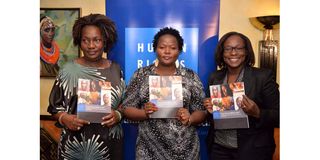Why Homa Bay could be one of the most dangerous counties for children

Human Rights Watch official Agnes Muriungi Odhiambo (centre) with Grace-Agenda founder Jaqueline Namuye (left) and Physicians for Human Rights Kenya official Christine Alai. Ms Odhiambo says women faced the highest burden of solitude during lockdown.
Homa Bay is one of the counties grappling with rampant child rights violations despite numerous campaigns to protect minors from abuse.
Cases of defilement, physical abuse, abduction, emotional abuse and others are still rife because most of them are not reported to the authorities, thus encouraging perpetrators to continue committing the crimes.
Of great concern, however, is neglect that is said to be fuelling the violations.
Data from the Child Protection Information Management System (CPIMS) shows that 2,700 of 4,000 cases of child rights abuse reported in the county between January and December 2021 were neglect.
Defilement was also at the top of the list, with up to 250 cases reported in the same period.
This comes even as government agencies launch different interventions to address abuse and save children from harm.
But some of the programmes have been unsuccessful.
To address these cases and reduce the number of children suffering in the county, an organisation called Compassion International has come up with a different approach.
It has brought together different actors in child protection programmes to combine forces and help vulnerable children.
Disharmony in the past
In the past, most organisations, including government ones, worked in isolation as they tried to tackle the problem.
In hospitals, for example, a defiled child would be told to go home after a medical examination when the case should be reported to the police for further action and possible prosecution of suspects. Officials from the organisation led the launch of a child neglect campaign in Homa Bay town, where state officers and other groups committed to protect children from abuse by combining their energy.
Compassion International partnership facilitator Richard Sijenyi said there used to exist a gap between different organisations on how children could be protected.
It stalled some of the approaches taken to protect children.
He said his organisation is bridging the gap by bringing together different partners to enhance, synchronise and share case reporting.
"We are forming a collaboration and working together towards addressing the cases. The launch is meant to bring together key decision-makers to include child neglect as one of the topics in their daily activities," Rev Sijenyi said at the event.
Homa Bay Deputy County Commissioner Jude Wasonga and county Children’s Services Director Peter Kutere were among senior government officers who attended the launch.
Some of the challenges said to be deterring children in Homa Bay from achieving their goals include alcohol, which is said to be the key driver of child neglect.
This happens when parents fail to provide food, clothing, education and shelter when they are drunk.
"Children who experience significantly limited caregiver responsiveness may sustain a range of adverse physical, emotional and mental health consequences that produce a more widespread development impeachment," Rev Sijenyi said.
Mr Wasonga attributed other cases of child neglect in Homa Bay to poverty and drug abuse.
He said national government administration officers are working round the clock to address some of the cases, including the fight against substandard alcohol.
Mr Kutere challenged political leaders in the county to include child neglect as one of their campaign issues.
He also asked voters to ask aspirants what they intend to do to address cases of child abuse in Homa Bay.
"The county still tops in teenage pregnancies yet no politician wants to talk about it. Voters should ask them to explain ways they will eradicate this problem," he said.
Compassion International is leading in addressing some of the challenges that parents in Homa Bay face that lead them to neglect their children.
Rev Sijenyi said the organisation supports caregivers by offering them financial training and capital to start businesses and invest.





